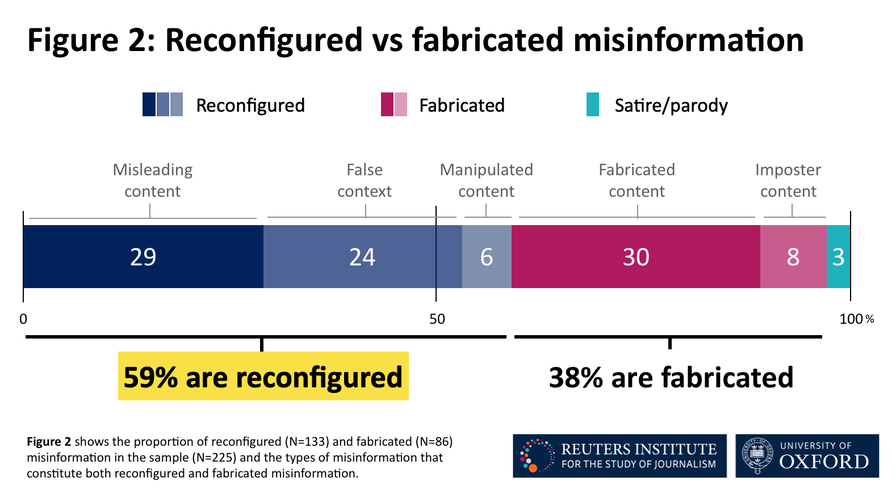Types, sources, and claims of COVID-19 misinformation | Reuters Institute for the Study of Journalism

my notes ( ? )
some of the main types, sources, and claims of COVID-19 misinformation seen so far... the number of English-language fact-checks rose more than 900% from January to March... coronavirus misinformation has almost certainly grown even faster...
most (59%)... various forms of reconfiguration... true information is spun, twisted, recontextualised, or reworked... (38%) was completely fabricated... no examples of deep fakes... reconfigured misinformation accounts for 87% of social media interactions...
top-down misinformation from politicians, celebrities... public figures ... 20% of the claims ... accounted for 69% of total social media engagement... . misleading or false claims about ... public authorities... the WHO or the UN, are the single largest category of claims identified...
On Twitter, 59% of posts rated as false in our sample by fact-checkers remain up. On YouTube, 27% ... Facebook, 24% ...up without warning labels...
reconfigured content saw higher engagement than content that was wholly fabricated... ‘misleading content’ (29%), contained some true information, but the details were reformulated, selected, and re-contextualised in ways that made them false or misleading...
images or videos labelled or described as being something other than they are (24%)... some call ‘malinformation’... few pieces of misinformation across the sample appeared intended to generate a profit....
much misinformation... questions the actions, competence, or legitimacy of public authorities ... difficult for those institutions to address or correct it directly ... How many people will accept as credible a government trying to debunk or refute misinformation that casts that very same government in a negative light?...
important that fact-checkers ... increase coordination to limit overlap ...there will be no silver bullet ... ‘cure’ for misinformation about the new coronavirus
Read the Full Post
The above notes were curated from the full post reutersinstitute.politics.ox.ac.uk/types-sources-and-claims-covid-19-misinformation?utm_source=social.Related reading
More Stuff I Like
More Stuff tagged covid19 , disinformation , factchecking
See also: Content Strategy , Social Media Strategy , Psychology , Social Web , Media